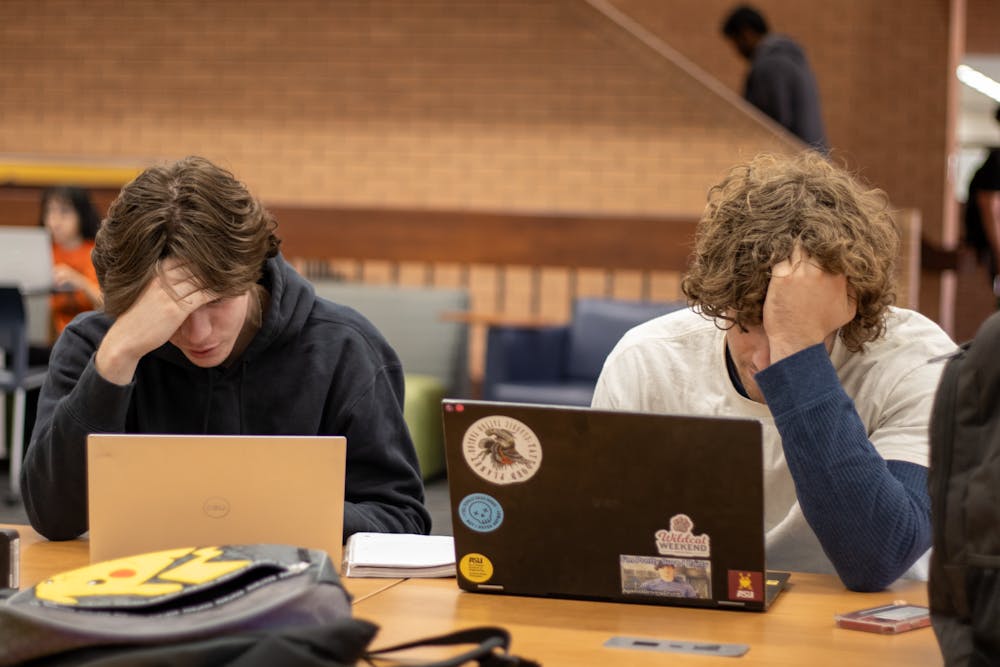ASU Online is the campus everyone forgets about, and it shows.
Online students have to deal with accelerated courses and large class sizes which makes keeping up even harder than for traditional in-person students. ASU should address this gap and make sure that online students also have a high-quality education.
Unlike in-person classes, the majority of ASU Online courses are accelerated, meaning their time frame is about seven and a half weeks instead of the regular 15 weeks for most in-person classes. ASU Online students also reported their classes typically being on the larger end, which makes it difficult to connect with one another.
Because of this, ASU should offer more semester-length courses and have smaller class sizes to aid with more personalized learning.
An ASU spokesperson did not respond in time to requests for comment.
Cass Dent, an ASU Online sophomore studying political science, said that this speedy format makes it harder to learn.
“(Accelerated courses make) it hard to have time to fully grasp the concepts before you're moving on to the next thing,” Dent said. “The classes are just very fast-paced.”
Another issue with learning virtually is that it is not as engaging as learning face-to-face. According to a study by the National Library of Medicine, face-to-face learning causes most people to feel more engaged with the content and are able retain it more easily.
Johanna Scarlata, an ASU Online freshman studying English, prefers learning in person for this reason.
“I was more engaged (in person). Online I’m just focused on getting things done and moving on to the next thing,” Scarlata said. “I'm still learning, but it's not staying in my brain as it (did) when I went to school in person.”
The rapid-paced courses do not do much to offset this learning loss. Rather than genuinely learning the content, Dent said she feels that she is only cramming the information.
“When you cram for a test, and you‘re like, ‘I need to take this test and get an A’, but it doesn’t matter how much I retain after,” Dent said. “It feels like a constant state of just cramming for the next quiz.”
Another issue with learning online is the struggle to have a connection with others and get that extra support. Luz María Hernández Chaparro, an ASU Online freshman studying physics, finds being an online student an isolating experience.
“I do feel alone because there's no one my age in my house,” Hernández Chaparro said. “I have no classmates that are sitting right next to me that I can (ask to) clarify a question that I have.”
Not being able to have those connections with fellow students and professors that in-person students have causes general loneliness and isolation among online students. Smaller class sizes and more engagement would be helpful because getting that personalized learning would close the gap between students and professors. It would help students to get to know each other.
However, ASU Online professors themselves are flexible and accommodating which does help lessen the load.
“If I emailed them, they’ll be there right away,” Hernández Chaparro said.
Some professors provide extensive help to make sure each student knows what they should be doing.
“I had a professor who, when I submitted an essay for my English class, made a five-minute full-length video just for me and for each student and posted it on YouTube, analyzing the paper step-by-step, and telling you what you need to fix specifically,” Scarlata said.
Although not all professors are the same, the majority of them do what they can to help students thrive in their courses. But their efforts alone are not enough to help students be engaged.
The problem lies within the structure of ASU Online courses rather than the professors individually.
For that, ASU needs to rethink the way online courses function, so online students do not have to struggle as much to get their education.
Edited by Mia Osmonbekov, Jasmine Kabiri and Caera Learmonth.
Reach the reporter at arebored@asu.edu.
Editor's note: The opinions presented in this column are the author's and do not imply any endorsement from The State Press or its editors.
Want to join the conversation? Send an email to opiniondesk.statepress@gmail.com. Keep letters under 500 words and be sure to include your university affiliation. Anonymity will not be granted.
Like The State Press on Facebook and follow @statepress on X.




